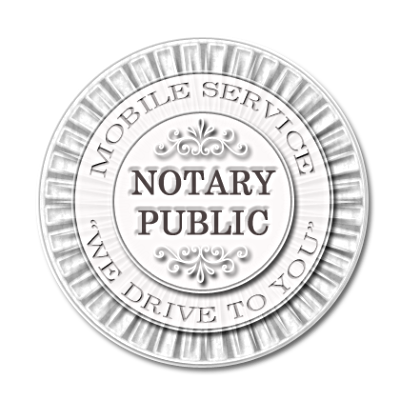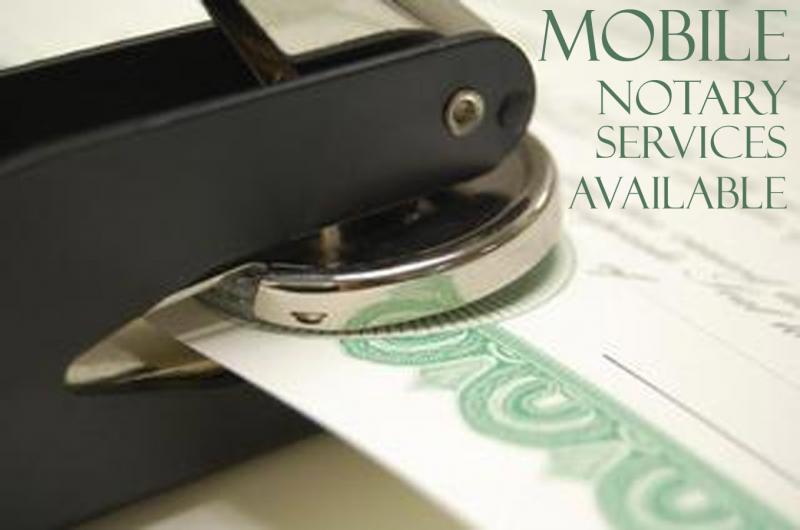

NOTARY PUBLIC SERVICES (SC)
A Notary Public is a third party witness that authorizes documents signed between two parties as legally binding. Business contracts are a big part of this service. A Public Notary helps prevent fraudulent activity in important legal documents. Not just anyone can be a notary public, you must get a special certification through the state government to become one. Each state has different laws regarding this process. Once a person becomes a certified signing agent, then they are part of the network of almost 5 million people in the United States who are notary publics.
Mobile Notary Services Save You Time Mobile notary services are becoming popular in today’s changing business economy. More people are doing business “outside of the box.” Whether working as a freelance contractor, or a traveling businesspeople, a notary service that can come to your office, home, or a coffee shop is be a valuable asset to have access to. By coming to you, a mobile notary service saves the time of both parties meeting up at a notary public’s office. You might pay a little more for this service, but if a contract needs to be signed on a deadline, it is worth cost of convenience.
They Can Be There for Matters of Property A notary is required for most real estate or mortgage procedures. Having them come out to the property will make the deal go much smoother for all the parties involved.
Or for Matters of Posterity When someone is in the hospital, and legal documents need to be signed about living wills, or last will and testaments then it becomes a matter of life and death to have a mobile notary service available to witness the signing of those documents.
Mobile Notaries Can Meet You Anywhere In today’s fast moving world, where deals are made day in and day out at a rapid pace, a business person might need a mobile notary public to come out to them at an airport to sign documents between destinations. Because It Is Just So Convenient Lastly, but most importantly, using a mobile notary public is so easy and hassle free. You can access a notary’s services after normal business hours, on the weekend, at any time or anywhere. A mobile notary service will meet you where the business is being done.
24 HOUR MOBILENOTARY SERVICES
Call for a Fast, Reliable and Professional Notary Public that will travel to your location, 24 hours - 7 days.
All our Agents are trained in Official Ethics and Responsibility, to better serve our Clients through-out the State of South Carolina.
All our Notaries carry an Identification badge (Ministerial Public Officer) and 'Notary Public" State of South Carolina commission card. Both credentials will be presented to all our Clients before conducting any Notarial Duties under the authority of our State.
We take our Commission with Pride and understand our role as Ministerial Public Officers in the course of Fraud-Prevention for the Citizens of the State.

SERVING ALL SOUTH CAROLINA COUNTIES
SC MARRIAGE & NOTARY SERVICES IS LOCATED IN THE CITY OF ROCK HILL, YORK COUNTY SOUTH CAROLINA.

What are the duties of a notary public? In the United States, a notary public is a person appointed by a state government (e.g., the governor, lieutenant governor, state secretary, or in some cases the state legislature) and whose primary role is to serve the public as an impartial witness when important documents are signed. Notary publics...
Wikipedia, the free encyclopedia en.wikipedia.org/wiki/Notary_public

What does it mean when it says my commission expires? The length for a notary's term of office varies from state to state but is most commonly four or five years. The notary commission expiration date is usually part of the wording on the notary's seal and is typically one of the required pieces of information that must go on each notary certificate for each notary act.
123notary.com Glossary - Expiration definition and information www.123notary.com/glossary/?expiration
DEFINITIONS, YOU should know when having Important documents notarized. If you are unsure of the meaning of an individual word, check the numbered-list below for a detailed definition.
SECTION 26-1-5. Definitions. For purposes of this chapter: (1) "Acknowledgment" means a notarial act in which a notary certifies that, at a single time and place, all of the following occurred: (a) an individual appeared in person before the notary and presented a record; (b) the individual was personally known to the notary or identified by the notary through satisfactory evidence; and (c) the individual signed the record while in the physical presence of the notary and while being personally observed signing the record by the notary. (2) "Affirmation" means a notarial act which is legally equivalent to an oath and in which a notary certifies that, at a single time and place, all of the following occurred: (a) an individual appeared in person before the notary; (b) the individual was personally known to the notary or identified by the notary through satisfactory evidence; and (c) the individual made a vow of truthfulness on penalty of perjury, based on personal honor and without invoking a deity or using a form of the word "swear". (3) "Attest" or "attestation" means the completion of a certificate by a notary who has performed a notarial act. (4) "Commission" means the empowerment to perform notarial acts and the written evidence of authority to perform those acts. (5) "Credible witness" means an individual who is personally known to the notary and whom the notary reasonably believes to be honest and reliable for the purpose of confirming to the notary the identity of another individual and the notary believes is not a party to or beneficiary of the transaction. (6) "Jurat" means a notary's certificate evidencing the administration of an oath or affirmation. (7) "Moral turpitude" means conduct contrary to expected standards of honesty, morality, or integrity. (8) "Notarial act", "notary act", and "notarization" mean acts that the laws and regulations of this State authorize notaries public of this State to perform, including the administering of oaths and affirmations, taking proof of execution and acknowledgments of instruments, and attesting documents. (9) "Notarial certificate" and "certificate" mean the portion of a notarized record that is completed by the notary, bears the notary's signature and seal, and states the facts attested by the notary in a particular notarization. (10) "Notary public" and "notary" mean a person commissioned to perform notarial acts pursuant to this chapter. A notary is a public officer of the State of South Carolina and shall act in full and strict compliance with this chapter. (11) "Oath" means a notarial act that is legally equivalent to an affirmation and in which a notary certifies that at a single time and place all of the following occurred: (a) an individual appeared in person before the notary; (b) the individual was personally known to the notary or identified by the notary through satisfactory evidence; and (c) the individual made a vow of truthfulness on penalty of perjury while invoking a deity or using a form of the word "swear". (12) "Official misconduct" means a notary's performance of a prohibited act or failure to perform a mandated act set forth in this chapter or other law in connection with notarization. (13) "Personal appearance" and "appear in person before a notary" means an individual and a notary are in the physical presence of one another so that they may freely see and communicate with one another and exchange records back and forth during the notarization process. (14) "Personal knowledge" or "personally known" means familiarity with an individual resulting from interactions with that individual over a period of time sufficient to eliminate any reasonable doubt that the individual has the identity claimed. (15) "Principal" means: (a) in the case of an acknowledgment, the individual whose identity and due execution of a record is being certified by the notary; (b) in the case of a verification or proof, the individual other than a subscribing witness whose identity and due execution of the record are being proven or signature is being identified as genuine; and (c) in the case of an oath or affirmation, the individual who makes a vow of truthfulness on penalty of perjury. (16) "Record" means information that is inscribed on a tangible medium and called a traditional or paper record. Record also may mean information that is inscribed on a tangible medium or that is stored in an electronic or other medium. (17) "Satisfactory evidence" means identification of an individual based on either: (a) a current identification document issued by a federal or state government agency bearing a photographic image of the individual's face, signature, and a physical description, except that a current passport without a physical description is acceptable; or (b) upon the oath or affirmation of a credible witness personally known to the notary public or of two witnesses who present an identification document as described in subitem (a). (18) "Seal" or "stamp" means a device for affixing on a paper record an image containing a notary's name, the words "notary public", and the words "State of South Carolina". The device may be in the form of an ink stamp or an embosser. (19) "Secretary" means the South Carolina Secretary of State or the Secretary's designee. (20) "Subscribing witness" means a person who signs a record for the purpose of being a witness to the principal's execution of the record or to the principal's acknowledgment of his execution of the record. (21) "Verification" or "proof" means a notarial act in which a notary certifies that: (a) an individual appeared in person before the notary; (b) the individual was personally known to the notary or identified by the notary through satisfactory evidence; (c) the individual was not a party to or beneficiary of the transaction; and (d) the individual took an oath or gave an affirmation and testified that he is a subscribing witness and as such (i) witnessed the principal who signed the record, or (ii) received the acknowledgement of the principal's signature from the principal who signed the record.
HISTORY: 2014 Act No. 185 (S.356), Section 1, eff June 2, 2014.
Mobile Notary Service Available 24 Hours a Day, 365 Days of the Year for your Convenience.
Contact SC Marriage and Notary Services for an Appointment.
Thank you for your Business.
SCMNServices
scmnservices@gmail.com
scmarriagenotaryservices@gmail.com
southcarolinamarriagenotaryservices@hotmail.com
(803) 339-0308 or (803) 339-0321